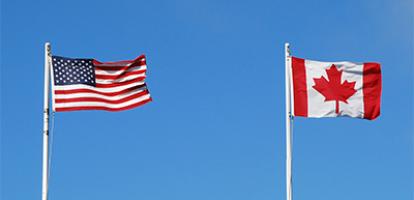From: Dan Ciuriak
To: The Canadian Business Community
Date: February 13, 2017
Re: Don’t Take a BAT to Trade Policy
The United States is an outlier amongst economically advanced countries as the only one that does not have a value added tax (VAT), which is the conventional and WTO-sanctioned approach to applying an economically efficient and non-trade-distorting consumption tax.
Under a VAT, the same tax is applied on imports as on domestic purchases. This means that all goods sold in a country are subject to the same amount of tax regardless of their country of origin. At the same time, all VAT paid on intermediate inputs – whether domestically sourced or imported – in producing a good is refunded to the producer. For goods that are exported, this provides a level playing field in their destination market with products from other sources since they all face the same sales taxes there, with no consumption/sales tax burden from their country of origin.
There is a perception in the US that the lack of a VAT has put trading firms at a disadvantage in international trade. This has led to a proposal to construct an alternative “border adjustment tax” (BAT) that replicates in some sense the trade neutrality of a VAT. Such a BAT is part of a proposed tax package that involves the repeal of the US corporate income tax, currently levied at 35% of taxable profits, and its replacement with a so-called destination-based cash-flow tax (DBCFT) levied at 20% for incorporated businesses and 25% for unincorporated businesses. Revenues from exports would be exempted but imported inputs would be denied as a deductible cost for business in arriving at their taxable base.
For the overall economy, an initial strong import-reducing and export-expanding effect from this tax would drive up the value of the US dollar in international currency markets, undermining the newfound competitiveness of US export-oriented businesses, while eroding the protection afforded by the BAT to US import-competing businesses. In the end, it could be a wash on net exports, addressing issues related to the international gaming of the US tax system by its own multinational corporations, as opposed to trade.
At the firm-level, the BAT would not be neutral, as it would impact on firms’ business decisions. A company could reduce its taxable income by switching from using imported inputs to using domestic inputs. Similarly, given a choice between an export sale and a domestic sale, the firm would face a tax liability on revenues from the domestic sale but none on the export sale and so would choose to make the export sale.
Applying a general equilibrium model analysis, our preliminary findings, published here, suggest that a BAT is economically damaging to the United States and to its trading partners. Canada’s exports to the United States are heavily weighted to intermediate inputs, including raw materials, basic fabricated materials, and manufactured inputs such as auto parts that go into value chains sponsored by US multinationals. The import component of a BAT thus impacts heavily on US firms’ decisions on sourcing from Canada, which absorbs a good portion of the tariff while still feeling a significant shift in US firms switch to domestic inputs. Overall, we find that the BAT would reduce Canada’s real GDP by almost 1 percentage point and Canadian prices by about 2 percentage points.
Dan Ciuriak is Fellow in Residence with the C.D. Howe Institute (Toronto), Senior Fellow with the Centre for International Governance Innovation (Waterloo), Associate with BKP Development Research & Consulting GmbH (Munich), and Director and Principal, Ciuriak Consulting Inc. (Ottawa).
To send a comment or leave feedback, email us at blog@cdhowe.org.





